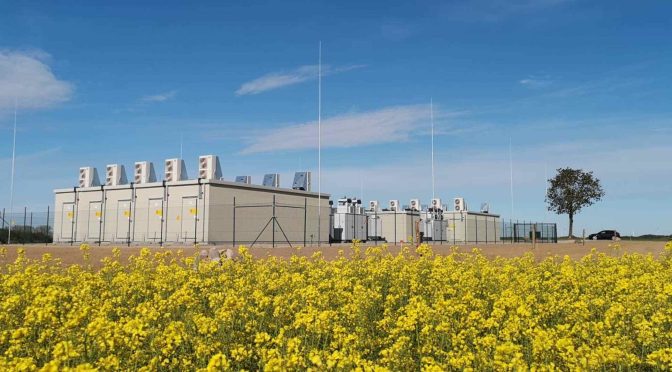As part of the Biden-Harris Administration’s Investing in America agenda, the U.S. Department of Energy (DOE), through its Loan Programs Office (LPO), today announced the closing of a $72.8 million loan guarantee to finance the development of a solar-plus-long-duration-energy-storage?microgrid. The microgrid will be located?on the Tribal lands of the Viejas (Baron Long) Group of Capitan Grande Band of Mission Indians of the Viejas Reservation near Alpine, California. This project—supported by a grant
from the California Energy Commission, investments from U.S. Bancorp Impact Finance, a subsidiary of U.S. Bank, and Starbucks—will provide the Viejas Band with reliable utility-scale renewable energy generation and storage infrastructure through the installation of a 15 MW photovoltaic solar generation system and a 70 MWh battery long-duration energy storage system. Today’s announcement underscores President Biden and Vice President Harris’ deep commitment to working with Tribal Nations and communities to build an inclusive, equitable, and resilient clean energy future.
“When President Biden and Vice President Harris say that every community deserves the opportunity to benefit from our clean energy future, they mean it,” said U.S. Secretary of Energy Jennifer M. Granholm. “Thanks to game-changing new funding from the Investing in America agenda, DOE is making a first-ever announcement through our Tribal Energy Financing Program—reinforcing this Administration’s commitment to helping build stronger, more resilient Tribal and Indigenous communities.”
“Amid surging energy demands, the Viejas Microgrid project is a win-win for the Viejas Band of Kumeyaay Indians and California’s clean energy goals,” said U.S. Senator Alex Padilla (CA). “California Tribes deserve energy independence and security as they adapt to the climate crisis, and the Inflation Reduction Act is making that priority a reality. This groundbreaking loan guarantee will reduce the Tribe’s energy costs, increase reliability, bolster their economic development, and create over 250 good-paying jobs.”
“As we continue to face the negative impacts of climate change, Tribal Nations must have the opportunity to address how their energy needs have evolved in order to better serve their communities,” said U.S. Senator Laphonza Butler (CA). “This investment from the Department of Energy will make sure that the Viejas Band of the Kumeyaay Indians are equipped with the necessary infrastructure to provide access to affordable and reliable clean energy.”
After solar and battery system installation, the Viejas Band of Kumeyaay Indians will purchase electricity through the project company under a long-term power purchase agreement (PPA) to help operate various commercial businesses including gaming, hospitality, and retail facilities. When complete, the project will allow the Tribe to benefit from a lower cost of energy
, allowing savings to be redirected toward investments by the Tribe in infrastructure maintenance, operation of the fire department, Tribal culture and educational programs, and other Tribal member services.
This project is expected to create 250 construction jobs and eight permanent operations jobs, including prioritizing Tribal-, minority-, and veteran-owned contractors—reinforcing the Biden-Harris Administration’s?Investing in America
?agenda to deliver new good-paying, high-quality jobs and grow regional economies.
The project developer, Indian Energy, is a 100% Native-owned microgrid developer and systems integration firm. Both the project company and the borrower, which is a TEDO, are owned by Indian Energy, Turtle Mountain Band of Chippewa Indians, and the Sault Ste Marie Tribe of Chippewa Indians.
LPO is providing a maximum guarantee of up to $72.8 million, for a U.S. Bancorp Impact Finance loan amount of at least $80.8 million (but up to $100 million) to complete the construction of the microgrid system. Additionally, DOE’s loan guarantee is supported by anchor investments from U.S. Bancorp Impact Finance and Starbucks to construct the solar microgrid providing renewable energy to the Tribal community.
Projects like Viejas Microgrid support President Biden’s efforts to enhance?Tribal?energy sovereignty by promoting Tribes’ ownership of clean energy assets or their deployment on Tribal lands and from the sale of their output to other off-takers. This project—and others supported by DOE—will help promote Tribal energy and economic development by helping Native communities unlock the benefits that come with the deployment of clean energy. In addition, LPO works with all borrowers to create good-paying jobs with strong labor standards during construction, operations, and throughout the life of the loan and to adhere to a strong Community Benefits Plan.
The project also supports President Biden’s?Justice40 Initiative, which established the goal that 40% of the overall benefits of certain federal investments, including LPO financing, flow to disadvantaged communities that are marginalized by underinvestment and overburdened by pollution. Federally Recognized Tribes are considered disadvantaged communities.
The project demonstrates how state and federal resources can come together for large-scale Tribal energy projects. The project developers have previously received approximately $43 million in state financial assistance through two grants from the California Energy Commission for the development of the cutting-edge, long-duration energy storage system that will provide renewable backup power to the Tribe and support statewide grid reliability in the event of an emergency. The Viejas Microgrid project supported by this loan guarantee would build on the state’s financial support.
Across all LPO’s programs, DOE has attracted 211 active applications for projects across the country totaling over $295 billion in requested loans and loan guarantees, as of August 2024. For more information about Viejas Microgrid, read the?conditional commitment blog post?and visit LPO’s?portfolio project page. Learn more about LPO’s Tribal Energy Financing Program and DOE’s efforts to promote Tribal energy development.


